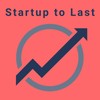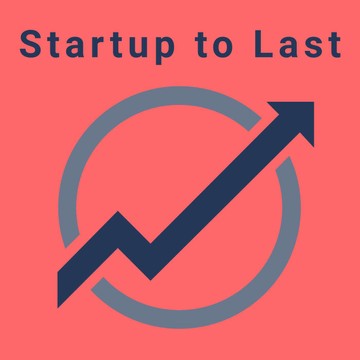

Startup to Last
Rick Lindquist and Tyler King
Two founders talk about how to build software businesses that are meant to last. Each episode includes a deep dive into a different topic related to starting, growing, and sustaining a healthy business.
Episodes
Mentioned books

May 29, 2020 • 1h 2min
Weighing options
Here are some of the topics we covered this week:Tyler's interns started and they're keeping him busy.Rick took a vacation over Memorial day weekend and feels refreshed.Tyler has been brainstorming his product strategy more since last week.Tyler gives an update on how May has been for Less Annoying CRM financially.Rick has added his first non "beta" client.Tyler used GDPR to get a company to delete some data.Rick has a new professional opportunity that would come at the expense of LegUp Health.We discuss the merits of masterminds and talk about the Microconf community.

May 22, 2020 • 1h
First revenue in the bank
Here are some of the topics we discussed this week:Rick made his first revenue with LegUp HealthTyler pimped out his home office with a new chairRick is using Heap for product analyticsLess Annoying CRM had a "CRM Coach day of rest" where developers handled support for the dayRick's intern has started and is already paying offTyler has a new framework for thinking about product improvementsWe discuss how several tech companies are moving to a more permanent remote work model

May 14, 2020 • 51min
The interns are coming
Here are the topics we covered this week:Tyler got a new standing desk.Rick hit a wall with his product.Both Rick and Tyler have interns starting soon. There's a lot of work to do to prepare.Less Annoying CRM had a breakthrough with their demo call workflow.Rick learned from the wisdom of Charlie Munger.Tyler is thinking about analytics because of a fan suggestion.LegUp Health got their first user referral.

May 7, 2020 • 56min
It's all about the updates
We tried out a new format in this episode. Instead of picking a deep dive topic and spending most of the time on that, we both had a lot of updates to give, so we spent the entire episode on that. Here are some of the topics we covered:Rick finished a project for a consulting client that probably won't get used. He talked about how deflating that feels, and how managers should be careful when doing this to employees.Less Annoying CRM just received money through the PPP and we discuss what should be done with the extra cash that frees up.Rick is dissolving one of his businesses as of July.Tyler reached a better understanding of when optimizations are good (i.e. everyone benefits) vs. when they're bad (i.e. the company makes money but the customer experience becomes worse)Rick's business taxes are done and we discussed the value of having an accountant who understands your unique needs.Tyler is thinking about moving Less Annoying CRM's marketing site to Webflow. We discussed the merits of building web sites in-house vs. using a third-party platform.Rick is looking into analytics tools to help understand user behavior.College students have been reaching out to Rick asking about internships for Startup to Last.

Apr 30, 2020 • 54min
The first 100 customers for a B2C company
The main question we addressed this week was whether Rick should spend his time selling within his personal network (which would be sure to work, but isn't really repeatable or scalable) or start building out a repeatable marketing channel. The main takeaway is that the repeatable channel would be more effective if he had more budget to spend on it, and the way to get there is by getting his revenue up as quickly as possible (which means using non-repeatable methods for now).

Apr 23, 2020 • 1h 4min
Marketing during a recession
Takeaways from this episode:It's important to separate marketing tactics from strategy. It's possible that specific tactics make sense, but you need to understand why you're doing those things? What's the goal?It's important to focus on a segment or niche, but not all niches are created equal. The goal is to find a niche where the people within it share with each other so that your work can have a multiplicative effect.

Apr 16, 2020 • 1h 3min
Attracting and compensating operating partners
Takeaways from this episode:Rick isn't at a point where he needs to figure this out right now. He thought he might need to know this so he could start courting potential employees for the future, but he can do that without knowing the details of compensation.Compensation is a combination of salary, benefits, equity, and other perks. One way or another, you need to put a package together that is competitive. One reason a lot of startups give stock options is because they can't afford to pay a high salary.Companies that aren't planning on exiting might not want to give equity because it's not worth much without an exit.If you want to share upside with employees without giving equity, you can offer a profit share. There are different models, and you can structure yours to align with the goals and incentives you want to provide to employees.

Apr 9, 2020 • 1h 3min
Building remote culture
There were a variety of different ideas thrown around in this episode. Here are some of the takeaways:Ideally, a healthy remote culture won't just mimic an in-person culture, it will actually take advantage of the unique characteristics remote has to offer.After companies start going back to in-person work, we shouldn't just go back to business as usual. We should try to maintain the things that are better about remote.There are a number of subtle elements of in-person conversations that break down over video chat because of the lag and worse audio quality. This makes it difficult to have more than 5-6 people in the same conversation remotely.One solution to this is to break into smaller groups.Another solution is to add structure to the conversation (e.g. everyone goes in a circle taking turns at doing something) so that people know who's turn it is to talk.Many relationship-building moments are based around sharing experiences. Consider what experiences can be shared online (playing games, watching the same video, etc.)There's not currently a tool for high-fidelity, asynchronous communication at a business. This is an opportunity to explore.

Apr 2, 2020 • 1h 9min
Dealing with impatience as a founder
Here are some takeaways from this week's episode:There are two common reasons for a manager to feel impatient: someone isn't motivated to work hard, or they're working hard but not getting enough done.The first type is best to avoid entirely by hiring people who are intrinsically motivated. If you can trust that they aren't intentionally slacking off, it takes a lot of pressure off your plate as a manager.The second type is frustrating, but it's not the employee's fault. If they're working hard but not getting the results you want, either your expectations are off, or you're not putting them in a position to succeed.Deadlines can be a major cause of impatience and can cause stress for the manager and the employee. Avoid deadlines when possible. Instead, break projects into small chunks and set targets, but don't put pressure on anyone to hit those targets exactly.If someone misses a target, have a discussion about why. Was it poor planning? Did something unexpected come up? Try to learn from that, but don't let it cause you to become impatient.Trust is a huge element in terms of working with urgency without being impatience. Building trust with your team is more about the process than the result. Let employees in on decisions you're making and make sure they feel heard.Founders need to manage their own mental state. Design the company to be able to handle slower than anticipated progress because things rarely go according to plan.

Mar 26, 2020 • 57min
Optimizing a customer service team
Here are some takeaways from this week's conversation:It's easier to optimize interactions with existing customers rather than new customers who are onboarding because with new customers, every change is more likely to mess up your onboarding funnel. Existing customers have more isolated support events.Start by collecting data from the support team on what they're spending their time on. Iterate on that to find insights about why support interactions can be low value.Identify the types of customers who aren't going to be a good fit in a self-service way (e.g. a form when they schedule a phone call) so you don't waste both sides' time with a call that doesn't need to happen.Put more information on your marketing site to let people disqualify themselves before signing up for a trial.This is a big topic. All you can do is collect information, form a hypothesis, and test it. Do that over and over forever.


